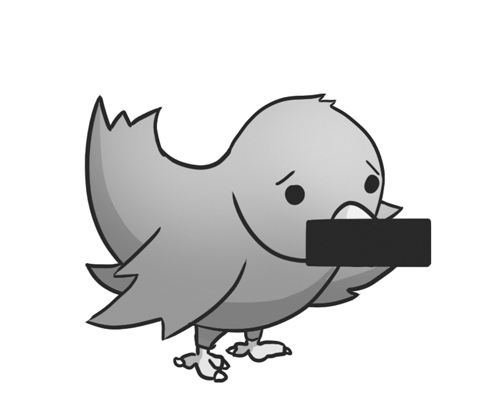Twitter gave students around the world a voice, but that might change thanks to their new policy
Aileen Ormoc
Contributor
Oppressed students around the world, you’ve all lost the chance for your Arab Spring.
Citizens and activist groups will have to find another platform to organize protest movements, thanks to Twitter’s new censoring policy.
Twitter announced their “country withheld content” policy on January 26. The microblogging service will now remove tweets based on local laws.
The announcement was made the day after the first anniversary of the Arab Spring.
In a blog post, Twitter says they “will enter countries that have different ideas about the contours of freedom of expression.” Some cultures differ so much from our ideas of expression, they say, that Twitter would not be able to exist there.
Tweets will be censored only if a local “authorized entity,” possibly a government official, complains. The censored tweet cannot be viewed within the country it originated from. However, locally censored tweets can still be viewed by outside nations.
Before the policy, if tweets were deleted they could not be viewed anywhere else in the world.
The service specifies that it does not filter tweets before they appear online.
The internet reacted to the news with outrage. Twitter users responded by boycotting the service during the #TwitterBlackout two weeks ago.
The public uproar surrounding Twitter’s policy follows the recent controversy surrounding the American Stop Online Piracy Act. Protesters argued the freedom and openness of the internet was threatened by the proposed US law.
Last year, Twitter was instrumental in spreading news of the Arab Spring youth movements in the Middle East. Twitter gave Western observers a near-live view into the civil disobedience and government repression.
Dr. Daniel Drache, a political science professor at York, sums up the reasoning behind the outrage.
“People see Twitter as the new freedom,” he says.
Founded in 2006, the San Francisco-based company continues to defend its position. They argue their philosophy remains unchanged.
“Our position on freedom of expression carries with it a mandate to protect our users’ right to speak freely,” Twitter says in its new rules section. “While we may need to release information as required by law, we try to notify Twitter users before handing over their information.”
Twitter explains that a user will be immediately notified via e-mail once their tweet has been censored. They argue that this sense of transparency is a step in the right direction for the company, its legal partners, and the general public.
Julian Manyoni, cultural theorist at the York Centre for International and Security Studies, says that “Even in the most ‘free’ societies, there are limits on speech, and those limits are always dictated by relationships of power. One cannot speak freely,” Manyoni warns, “without consequences; legal, personal, or otherwise.”
Twitter did what most companies are forced to do—make a decision pleasing both corporate ties and an overall user base.
Twitter, like other social media platforms, is a business. For the business to thrive, it must satisfy the public while considering profitability as well. The company’s emphasis on freedom of expression must contend with the bottom line.
Twitter is firm that the new policy is unconnected to a $300-million investment recently made by billionaire Saudi Prince Alwaleed bin Talal Mac.
“It is in Twitter’s corporate interest to adhere to local laws to facilitate expansion,” Manyoni says, “thus, the censorship.”
In their famous “the Tweets must flow” blog post during the Arab Spring, Twitter said their goal is to “instantly connect people everywhere to what is most meaningful to them. For this to happen, freedom of expression is essential.”
Twitter’s commitment to pure free speech remains to be seen. It is, however, in the hands of the public to determine if and how this new policy will affect the individual’s ability to start change.
While Twitter has been an effective tool for activists, it is important to note that social media is not a necessity to create change. In addition to an online presence, activists of all types should have a physical presence for their message to be heard.
Manyoni reminds that revolutions occurred before the days of Twitter and Facebook.
“Social change and even successful revolution,” he says, “far predates social media or mass media of any sort.”
Meaning students cannot limit political activism to 140 characters.
With files from Huffington Post, The Toronto Star



